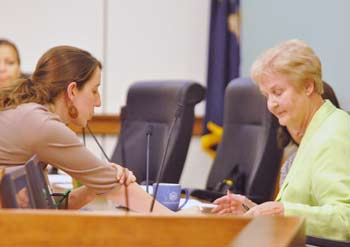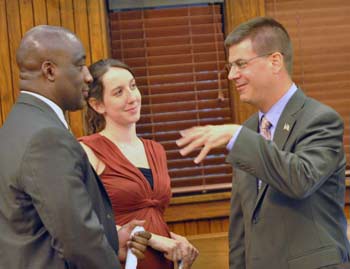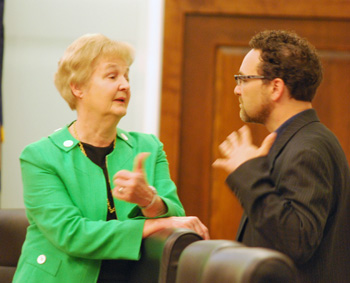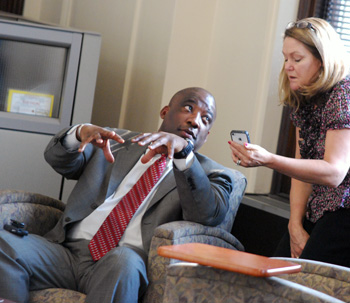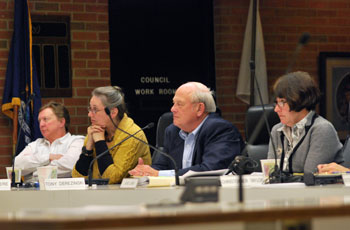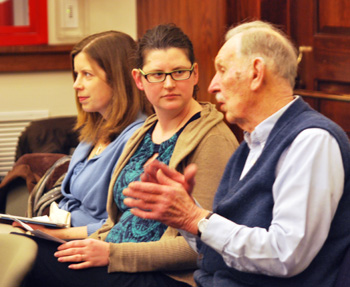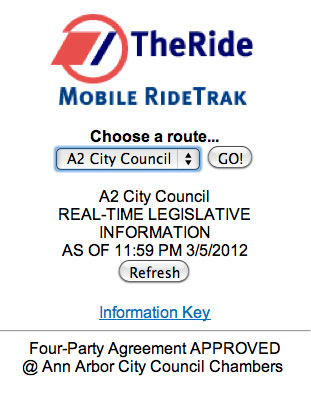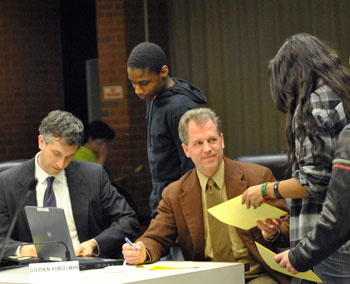Washtenaw Board to Re-Vote on Transit Accord
Again on the agenda of the Washtenaw County board commissioners for Sept. 5 will be the articles of incorporation for a new countywide transit authority. The intended outcome is not for the board to rescind or amend in a significant way the articles it approved on Aug. 1, 2012 – on a 6-4 vote.
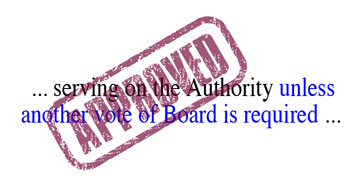
Once again on the agenda for the Washtenaw County board of commissioners meeting on Sept. 5 will be the articles of incorporation for a new transit authority. It’s expected to be a stamp of approval for some administrative changes, not a chance to change the document or rescind the board’s previous decision to approve the document.
Instead, the point of re-introducing the agenda item is to provide an opportunity for the board to affirm the administrative changes to the articles of incorporation that took place after the board’s Aug. 1 vote.
The administrative changes were already included in the documents by the other three parties to the four-party agreement when they subsequently ratified the document. Those parties are the cities of Ann Arbor and Ypsilanti, and the Ann Arbor Transportation Authority, which is leading this effort. The Ann Arbor city council voted (for a third time) to approve the articles of incorporation at its Aug. 9, 2012 meeting; the Ypsilanti city council voted at its Aug. 14 meeting (also for a third time); and the AATA board voted (for a second time) at its meeting on Aug. 16.
News of the agenda item came from an email sent by Washtenaw County board chair Conan Smith to other commissioners on the evening of Aug. 22. It’s not entirely clear whether the board will: (1) take a vote that affirms the administrative (non-substantive) nature of the changes that were made after the board approved the document on Aug. 1; or (2) take a vote that amends the document to match the version approved by the other three parties.
Previous re-votes have been driven by substantive amendments made by one of the parties to the agreement. For example, the Ypsilanti city council amended the four-party accord after the Ann Arbor city council first voted, on March 5, 2012. That amendment involved service charges applied to the respective cities’ existing millages. When the agreement went back to the Ann Arbor city council, that body amended the document further – which meant that it returned to the Ypsilanti city council for its approval again. The AATA board then ratified the agreement.
It was expected to be approved by the Washtenaw County board of commissioners without further substantive amendment. But on Aug. 1 the board made a change to the size of the majority needed, in order for the new transit authority’s board to change the articles of incorporation – from 2/3 to 4/5 of the 15 board members. That triggered the most recent round of approvals by the various bodies.
But those approvals incorporated some changes that were driven by a desire to harmonize the county board’s amendment with the rest of the document, as well as with Act 196 of 1986 – the act under which the new transit authority will be incorporated. For example, the 4/5 majority requirement for changes to the articles of incorporation is at apparent odds with one kind of change to the articles specifically mentioned in Act 196 – a change in jurisdictions that are part of the authority. Act 196 explicitly indicates that a 2/3 vote is required. So an administrative change undertaken after the board’s Aug. 1 meeting was to add the clause: “… unless another vote of Board is required under the terms of these Articles or provided for in Act 196.”
The view of legal counsel for the four parties was apparently that it’s not actually necessary for those changes to be explicitly re-voted and affirmed by the county board of commissioners. However, there is at least some sentiment on the county board that the changes might be construed as substantive and contrary to the intent of the county board, which could become an unnecessary point of contention down the road.
The AATA is current finalizing the details of a five-year service plan that will need to be published as one of several conditions that must be met before the AATA could transition into the newly incorporated authority, to be called The Washtenaw Ride. This week, the AATA board called a special meeting for Sept. 5 to unveil that service plan.
Earlier in the year, the AATA had hoped to be in a position to possibly place a transit millage proposal on the ballot this November. But at this point, that won’t be possible. Any transit millage proposal will come at a later election.
After the jump, this report describes the administrative changes in question and possible misinterpretations. [Full Story]





